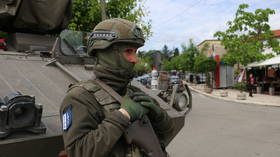Kosovo situation most difficult in 24 years – Vucic
The Serbian president has accused the breakaway region’s leaders of waging a hybrid war on Belgrade, with the West turning a blind eye
Tensions in the breakaway province of Kosovo are at their worst in almost a quarter of a century, Serbian President Aleksandar Vucic has warned. He accused the West of condoning the latest crackdown on Serbs, unleashed by ethnic Albanians in the self-proclaimed republic.
Speaking on Sunday, Vucic said: “A hybrid war is being waged against Serbia, and Western countries allow the shooting and mistreatment of Serbs.”
The official went on to describe the situation in the region as the “most complex in the last 24 years,” with ethnic Serbs “under severe attack.”
Vucic pledged to do his best to “keep the peace,” while warning that Belgrade “will not allow further harassment and endangering the lives of the Serbian people.”
The Serbian head of state demanded that the authorities in Pristina release “innocent Serbs” taken into custody recently, and withdraw their special forces from the predominantly Serbian-populated areas of northern Kosovo. Vucic also urged Kosovo Prime Minister Albin Kurti to recall the ethnic Albanian mayors, whom the local Serbian community claims were installed as a result of bogus elections in several municipalities.
Vucic also rejected a proposal made by top EU diplomat Josep Borrell to hold a meeting between him and Kurti. According to the Serbian head of state, his country has already made too many concessions, and he is not prepared to discuss any more.
He also took a swipe at Western powers, which, according to Vucic, have never really taken Serbia seriously and have been supporting the Kosovo government.
On Wednesday, the Serbian president accused Kosovo authorities of trying to provoke a war, after the breakaway province closed the border to all Serbian vehicles and detained several prominent Serbs.
Kurti took the measures a day after Serbian security forces detained three Kosovo police officers. While Pristina insisted they had been abducted from Kosovo, Belgrade argued that the trio had crossed into Serbian territory.
The European Commission, too, warned Kosovo of “financial and political consequences” unless Kurti’s government made a meaningful effort to de-escalate the situation.
Violence flared up after Pristina held municipal elections in the north of the region, with the vast majority of the predominantly Serbian local population boycotting them.
Nevertheless, Kosovar authorities attempted to install the four ethnic Albanian mayors, who claimed victory in the vote, by force.
While Brussels initially recognized the controversial results, it then called for a fresh vote and the withdrawal of Kosovo riot police from the area.





Comments are closed.